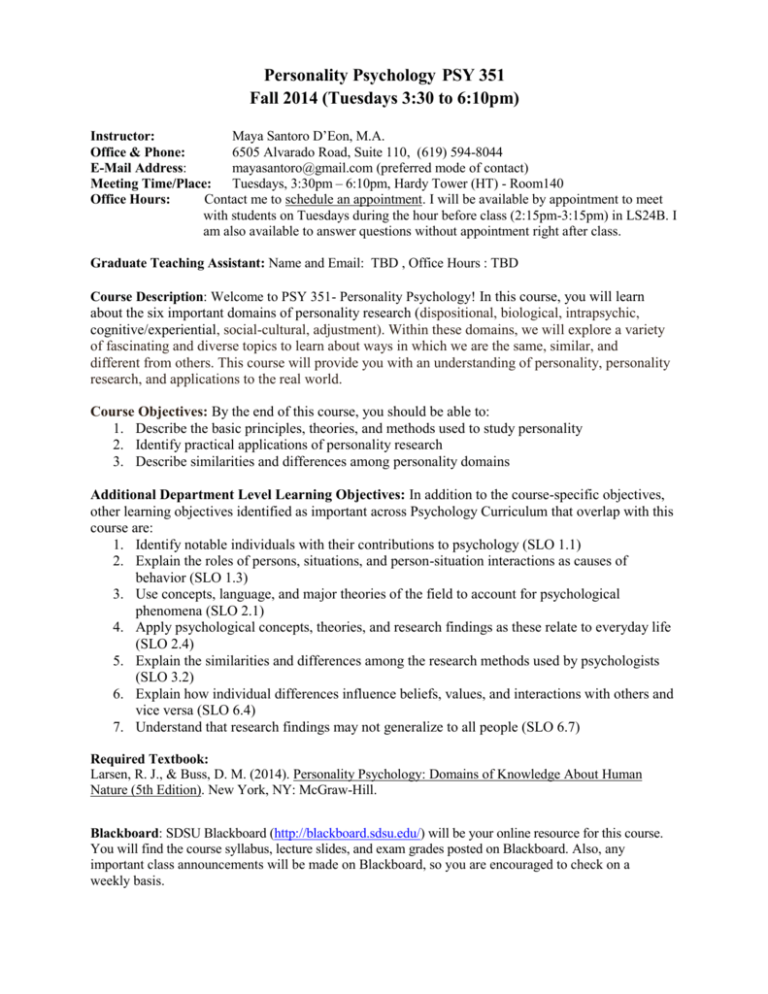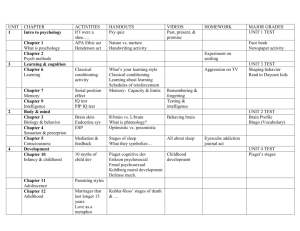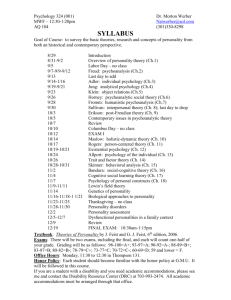View/Open
advertisement

Personality Psychology PSY 351 Fall 2014 (Tuesdays 3:30 to 6:10pm) Instructor: Maya Santoro D’Eon, M.A. Office & Phone: 6505 Alvarado Road, Suite 110, (619) 594-8044 E-Mail Address: mayasantoro@gmail.com (preferred mode of contact) Meeting Time/Place: Tuesdays, 3:30pm – 6:10pm, Hardy Tower (HT) - Room140 Office Hours: Contact me to schedule an appointment. I will be available by appointment to meet with students on Tuesdays during the hour before class (2:15pm-3:15pm) in LS24B. I am also available to answer questions without appointment right after class. Graduate Teaching Assistant: Name and Email: TBD , Office Hours : TBD Course Description: Welcome to PSY 351- Personality Psychology! In this course, you will learn about the six important domains of personality research (dispositional, biological, intrapsychic, cognitive/experiential, social-cultural, adjustment). Within these domains, we will explore a variety of fascinating and diverse topics to learn about ways in which we are the same, similar, and different from others. This course will provide you with an understanding of personality, personality research, and applications to the real world. Course Objectives: By the end of this course, you should be able to: 1. Describe the basic principles, theories, and methods used to study personality 2. Identify practical applications of personality research 3. Describe similarities and differences among personality domains Additional Department Level Learning Objectives: In addition to the course-specific objectives, other learning objectives identified as important across Psychology Curriculum that overlap with this course are: 1. Identify notable individuals with their contributions to psychology (SLO 1.1) 2. Explain the roles of persons, situations, and person-situation interactions as causes of behavior (SLO 1.3) 3. Use concepts, language, and major theories of the field to account for psychological phenomena (SLO 2.1) 4. Apply psychological concepts, theories, and research findings as these relate to everyday life (SLO 2.4) 5. Explain the similarities and differences among the research methods used by psychologists (SLO 3.2) 6. Explain how individual differences influence beliefs, values, and interactions with others and vice versa (SLO 6.4) 7. Understand that research findings may not generalize to all people (SLO 6.7) Required Textbook: Larsen, R. J., & Buss, D. M. (2014). Personality Psychology: Domains of Knowledge About Human Nature (5th Edition). New York, NY: McGraw-Hill. Blackboard: SDSU Blackboard (http://blackboard.sdsu.edu/) will be your online resource for this course. You will find the course syllabus, lecture slides, and exam grades posted on Blackboard. Also, any important class announcements will be made on Blackboard, so you are encouraged to check on a weekly basis. Pre-Requisite for this course: To take PSY 351, you must have completed PSY 101 (Introductory Psychology) or an equivalent Introductory Psychology course from another school. Lecture Format: This course is delivered in a weekly lecture. Each lecture will cover content from a chapter in the textbook and will introduce additional learning material. Although the class size is relatively large, active participation is encouraged, and quite frankly, it makes the experience of learning more engaging and enjoyable. Because of the breadth of material covered in this course, it is strongly recommended that students complete the chapter readings prior to the lecture. This helps to provide a foundation that the lectures will build on. I encourage students to ask questions during class if clarification of the material is needed. Attendance: Class attendance is strongly recommended. Exams will be based on material from class lectures and the textbook. Lecture notes are not available from Teaching Assistants or the instructor. If you are unable to attend a lecture, please borrow notes from a classmate. Cell Phones: When in class, please keep your cell phones are turned off. If you need to take a phone call during class, please let the instructor know at the outset of class, turn your phone to vibrate, and leave the room to take the call. Emergency Preparation: Students are responsible for becoming familiar with the evacuation plan of the specific classroom. The evacuation plan is posted within each classroom. Exams: This course has 3 non-cumulative, multiple-choice exams that will test your knowledge of the lectures and textbook readings. Each exam is worth 1/3rd of your final grade. The exams are each worth 100 points and consist of 50 items. Please arrive on time for the exams. If you arrive to an exam after the first person has finished the exam and left the room, you will NOT be allowed to take the exam. Once you have started the exam, you may not leave the classroom for any reason (e.g., phone call, bathroom) until you have turned in the exam. Practice Quizzes for each chapter can be found on the Textbook website: http://highered.mcgraw-hill.com/sites/007803535x/student_view0/index.html The only exception for a missed exam will be for a medical or family emergency, and you must have documented proof of the emergency (a doctor’s note). You must inform the instructor of the emergency within 2 days of the regular exam date. All make-up exams will be essay format. IMPORTANT EXAM PREP: a) Bring the Wide Red Par Score (#F-288-PAR-L) form to Exam 1 b) Bring the Narrow Red Par Score (#F-289-PAR-L) form to Exam 2 and Exam 3. c) Bring a #2 pencil to each exam. d) Bring your RedID or other photo ID to each exam to show it as you turn in your exam. Final Grading Scale: The final grading scale based on total points for the 3 exams is as follows: 279-300 --> A 270-278 --> A264-269 --> B+ 249-263 --> B 240-248 --> B234-239 --> C+ 219-233 --> C 210-218 --> C204-209 --> D+ 189-203 --> D 180-188 --> D000-179 --> To be fair, extra credit opportunities will not be offered. To improve grades, students are encouraged to form in-person/online study groups, attend TA office hours, and contact the instructor with questions. Students with Special Needs: If you are a student with a disability and need accommodations for this class, you are responsible for contacting Student Disability Services at (619) 594-6473 or online at http://www.sa.sdsu.edu/sds. To avoid any delay in the receipt of your accommodations, you should contact Student Disability Services as soon as possible. After Student Disability Services is contacted, students should contact me about accommodations needed as soon as possible. Once I have received an accommodation letter from Student Disability Services, I will be able to provide accommodations. Plagiarism, Cheating, and Academic Dishonesty: Plagiarism and cheating of any form will not be tolerated, and will be dealt with through the appropriate university channels. If you are caught cheating on an exam, you will receive a zero on the exam, and you are likely to receive an F in the course. In addition, the incident will be reported to campus authorities and may lead to probation, suspension, or even expulsion from the University. If you have any questions about what constitutes plagiarism or other violations of the academic integrity policy, please speak with the instructor and review the Student Code of Conduct: http://www.sa.sdsu.edu/srr/conduct1.html. TENTATIVE COURSE SCHEDULE Date Scheduled Topic Chapter Assignment Aug 26 Course Overview, Introduction to Personality Psychology Sept Personality Assessment, Measurement, & Research Design ust 02 Sept 09 Traits & Trait Taxonomies Sept 16 Personality Dispositions over Time: Stability, Coherence, & Change Sept 23 Exam #1 Sept 30 Genetics & Personality Oct 07 Psychoanalytic Approaches to Personality Oct 14 Motives & Personality Oct 21 Cognitive Topics in Personality Oct 28 Exam #2 Nov 4 Personality and Social Interaction Nov 11 Veteran’s Day- No Class Nov 18 Sex, Gender, & Personality Nov 25 Stress, Coping, Adjustment & Health Dec 2 Disorders of Personality Dec 9 Exam #3 Dec 16 Review of Exam (4pm – 6pm) 16 Note: Dates and topics for course schedule are tentative, and students are responsible for any announcements made in class concerning schedule, exam, and reading assignment changes. 1 2 3 5 6 9 11 12 15 16 18 19





